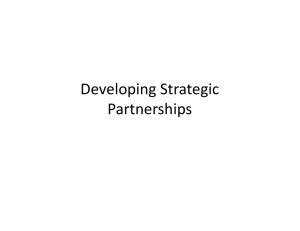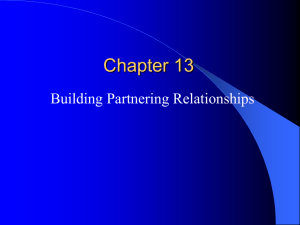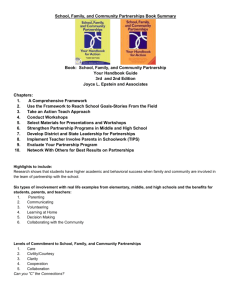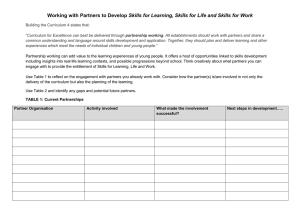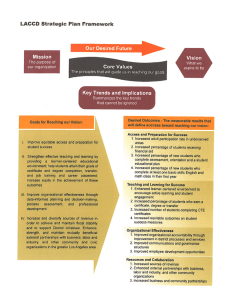INTERACTIVE LEARNING IN RURAL PARTNERSHIPS LIGA PAULA
advertisement
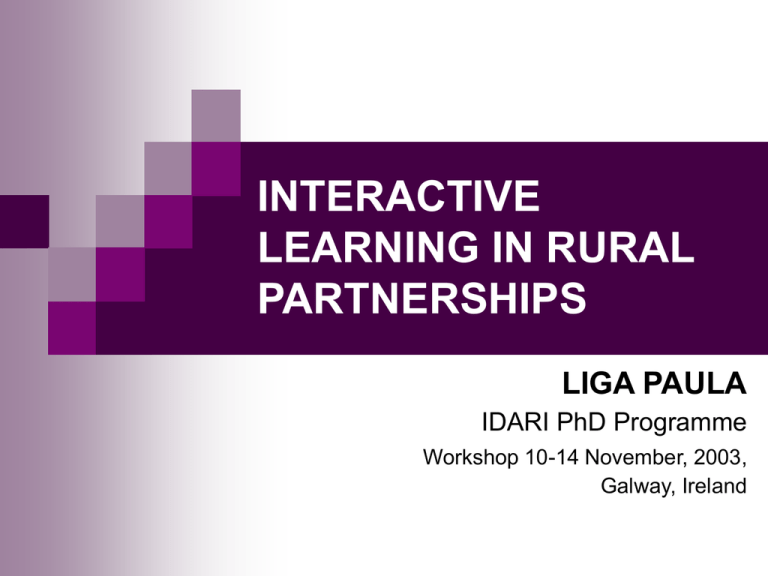
INTERACTIVE LEARNING IN RURAL PARTNERSHIPS LIGA PAULA IDARI PhD Programme Workshop 10-14 November, 2003, Galway, Ireland PARTNERSHIP: is an institutional arrangement in which objectives are shared and a common agenda is developed between the different actors in pursuit of a common goal (Slee, Snowdon) promotes integration both vertically (between different tiers of government) and horizontally (between different spheres of society) (Benington, Geddes) is a possibility for collaboration between different stakeholders with potentially competing or conflicting interests (Benington, Geddes) PARTNERSHIPS & RURAL DEVELOPMENT IN LATVIA New discourse of public participation in rural development - partnerships as an institutional arrangements that involves local governments, NGOs, individuals, citizen action groups, state and municipal institutions, private sector organizations Preparing and implementation of local development strategies and projects Access to significant EU structural funds (e.g. SAPARD) Reduction of socio-economic problems (e.g. social exclusion, unemployment) PARTNERSHIPS IN OPERATION: MAIN OBSTACLES Incomplete communication Passivity and indifference Insufficient technical infrastructure Former experience of co-operation in soviet farms Weakness of informal horizontal social structures (e.g. low level of social capital, lack of trust) Lessening of importance of mutual learning RESEARCH QUESTIONS What is the role of interactive learning in building social capital in rural partnerships? Is the learning a key factor? How learning takes place? What is the role of social networks in successful operation of partnerships? How to strengthen existing networks and how to build new ones? Why good ideas sometimes fail? RESEARCH METHODOLOGY Theoretical studies on integrated rural development, learning processes in partnerships, social capital and social networks Snowball sampling In-depth interviews THEORETICAL FRAMEWORK Moving from ‘knowledge-based economy’ to ‘learning economy’ (Lundvall,2002) Partnership approach: new discourse for integrated rural development in Latvia Partnerships as communities of practice / learning communities (Lave, Wenger, 1991) Social capital and more developed social networks as a result of interactive/mutual learning (Kilpatrick,1998; Falk,1999) WHY LEARNING IS IMPORTANT? Actors improve local knowledge about local area and its development Through adoption and change actors develop new skills, knowledge and values (e.g. communication, collaboration, mutual trust, sense of membership to community) Sharing of skills between partners leads to greater efficiency and cost saving ‘Learning by doing’ PROPOSED RESEARCH AREA THANK YOU!
